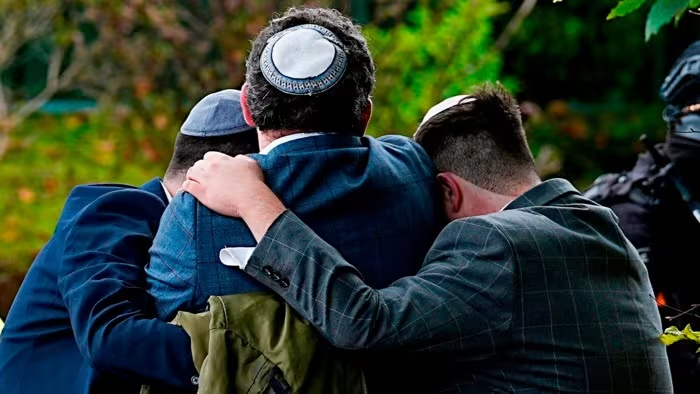Marc Levy was about to attend Thursday morning’s Yom Kippur service at the Heaton Park Hebrew Congregation Synagogue in Manchester when news broke of the atrocity his community had long feared.
“It’s been an inevitability that something like this would happen,” said Levy, chief executive of the region’s Jewish Representative Council, of the first fatal terror attack targeting the UK’s Jewish community in at least 30 years.
At 9.31am police had received a call reporting that a car had been driven into people outside his synagogue and that a man had gone on the rampage with a knife.
Within seven minutes, armed officers had shot dead the attacker, who was wearing what appeared to be an explosive device, which police later said was “not viable”.
On Thursday evening, police said they believed the attacker was Jihad Al-Shamie, 35, a British citizen of Syrian descent. Al-Shamie came to the UK as a young child and was granted British citizenship in 2006, according to a government insider.
The police said their records showed no previous referrals of Al-Shamie to Prevent, the government’s anti-radicalisation programme.
Two men in their thirties and a woman in her sixties have been arrested on suspicion of commission, preparation and instigation of acts of terrorism.
Armed police officers at the scene near the Heaton Park synagogue © Peter Byrne/PA Wire
On Friday morning, police named the two people killed in the attack as Adrian Daulby, 53, and Melvin Cravitz, 66. Three others remain in hospital with serious injuries.
Manchester’s Jewish community — the UK’s second-largest — is reeling from an atrocity that follows a sharp rise in antisemitic hate incidents since the October 7 2023 attack on Israel by Hamas.
Security covering synagogues and schools in the Crumpsall area, where Thursday’s terror attack took place, has always been high, as it has been in surrounding, heavily Jewish neighbourhoods.
The UK’s Jewish community has its own organisation, the Community Security Trust, which liaises closely on the issue with police.
However, Levy said that with the rise in antisemitic crime over the past couple of years, security had been stepped up even further “for this very reason”.
The CST’s latest data for January to June 2025, published in August, showed 1,521 antisemitic incidents in the UK.
This is the second-highest total of anti-Jewish hate incidents recorded by CST in the first half of any year, surpassed only by the first six months of 2024, when 2,019 antisemitic incidents occurred in the immediate aftermath of the October 7 attack.
Manchester is a city that prides itself on cohesion. After the 2017 Islamist terror attack on the Manchester arena, when 22 people died at the hands of suicide bomber Salman Abedi, maintaining such cohesion was an immediate priority.
The part of the city where the latest attack took place is particularly multicultural, having been home to wave upon wave of immigration over the centuries. It contains long-established Jewish and Muslim communities living side by side.
Manchester leaders moved quickly on Thursday to restore a sense of calm by emphasising cohesion. Afzal Khan, now Labour MP for Rusholme in the south of the city, co-founded the Muslim Jewish Forum of Greater Manchester. Khan said he was “praying” for the Jewish community on its holy day.
“Violence is never the answer and Manchester must stand together against these actions,” he added.
Mayor of Greater Manchester Andy Burnham, left, speaks at a press conference near Heaton Park synagogue. Home secretary Shabana Mahmood is second from right, and chief constable Sir Stephen Watson is at right © Peter Byrne/PA
Greater Manchester mayor Andy Burnham, speaking at the scene on Thursday evening, said the city region “will never let acts that are designed to cause hatred, division in our communities, violence — we will never let them succeed”.
Prime Minister Sir Keir Starmer also moved to calm the Jewish community. “I promise you I will do everything in my power to guarantee you the security you deserve, starting with a more visible police presence protecting your community,” he said.
The government immediately stepped up security across the country, with police saying they had deployed additional officers around synagogues and Jewish community sites in London.
Such moves are unlikely to resolve the fear within Manchester’s Jewish community, however.
Standing at the police cordon a couple of hours after the attack, one young Jewish woman was fighting back tears as she spoke to the Financial Times.
“I’m just scared,” she said, adding that she now felt “at risk” because of her religion in a way she had not done previously.
“But it does all make sense, because it’s . . . like they knew what today was,” she said, referring to Yom Kippur, when Jews attend synagogue in large numbers.
Orthodox men walk near the scene of the attack on Thursday: Manchester’s Jewish community is the UK’s second largest © Ian Hodgson/AP
The timing of Thursday’s attack meant many worshippers elsewhere in the city would not have known immediately that it had occurred.
Levy, whose father and grandfather had both served as presidents of the synagogue, only found out that his own parents were safe after seeing them on TV coverage.
He acknowledged Manchester’s reputation for multiculturalism, but said his community had long been having drastic conversations.
“I think we’re going to have to start looking at alternatives,” he said about whether the country was a safe place for Jews.
“This conversation has been happening around dinner tables now for 12 to 18 months,” he said of “whether the Jewish community is welcome in the UK”.
“And,” he added, “whether the country will be as welcoming to my children as it has been to four or five generations”.

